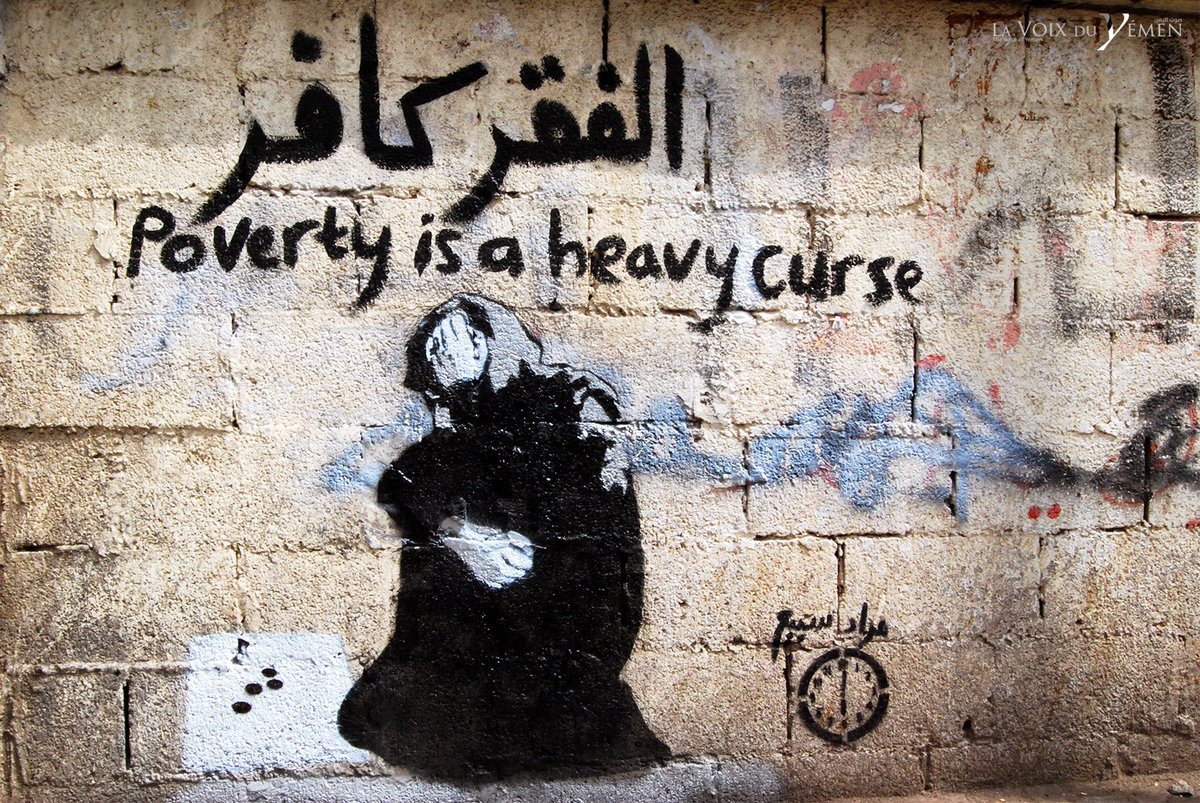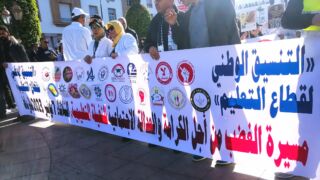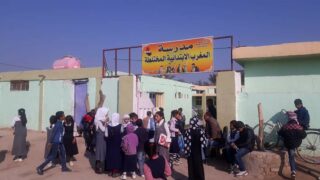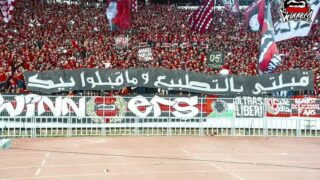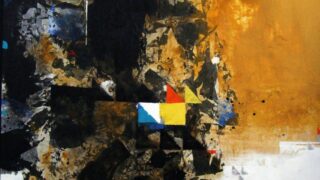
This publication has benefited from the support of the Rosa Luxemburg Foundation. This text may be reproduced in part or in full, provided the source is acknowledged.
The fragmented reality of the Moroccan left is due to the absence of an overarching vision or project. In the past, leftists had a social discourse that, despite its many shortcomings, was able to touch the popular and poor classes throughout different economic and social events and crises (droughts, structural adjustment policy, the "years of lead” revolution 1981...) andspread its ideas among people. The Moroccan left has often attributed its failure to the repression it faces. It is not possible to deny the harsh repressive measures with which the ruling authority has struck the left, such as arrests, abuse, kidnapping, accusations of treason, and demonization. However, the discourse of injustice cannot solely account for the left’s failure.
The experience of the “Socialist Union of Popular Forces” (USFP) - the main historical leftist party - has been described as a “Makhzen” experience (1) (meaning that it is related to power, benefits from it, or is contained within its circles). Despite the militant history of many left-wing political entities, their stand against all forms of tyranny and corruption and their fierce demand for change and enlightenment, their participation in what is known as the “rotation government” in the late 1990s has altered this picture.
That government made mistakes, errors and transgressions to the extent that some of its ministers and politicians became involved in cases of corruption. Worse, however, was its adoption of a policy of privatization, through its approval of selling institutional shares or entire governmental contracting deals, unprecedented in the history of the country. As a result, Moroccans started to regard the left as nothing but an “exploiter”, selling them illusions for its own utilitarian purposes.
The Realities of the “Left” in Morocco
01-03-2020
“The left is not responsible for these errors.” Some leftists exonerate themselves from this political experience, to the point that they now classify the “Socialist Union of Popular Forces” and the “Party of Progress and Socialism” as non-left parties. In their view, these are “Makhzen”, “Administrative” parties. Many regard this experience as the beginning of the downhill slide of the Moroccan left. The left-wing Democratic Way Party considered this a complete surrender to the “Makhzen”, as the rotation happened purely within the power elite’s circles, that is, a continuation and strengthening of the Makhzen’s power, which has helped the latter to overcome the deep economic crisis that the former king called “a risk of cardiac arrest.” This “happened at the expense of the mainly impoverished and industrious groups, and facilitated a swift transfer of power from one king to another.” (2)
The Left and The Parliamentary Monarchy
Since the beginning of the “20 February” movement in 2011, loud voices of opposition have been calling for the removal of corruption and tyranny. At this stage, the left, represented in the parties of the “Federation of the Democratic Left”, began to demand a parliamentary monarchy, within the framework of the current political system. The left participates in elections that do not usually respect democratic conditions and transparency, and are manipulated to accommodate the interests and balances of political scores that satisfy the ruling class. “We do not want to remove the king, but to further strengthen him.” Omar Belafrije responds to those who question the intentions of his political bloc, confirming that a parliamentary monarchy would safeguard the king’s prestige while, at the same time, guaranteeing the cohesion and stability of the country. “Logically, whoever rules must be held accountable, yet we do not want and we cannot hold the king accountable. His status and prestige must be safeguarded, whereas the normal procedures must be taken care of by the government. If the Moroccans do not like these procedures, they can protest and vote against them. But if they do not like the King’s decisions, what can they do?” (3)
“We do not want to remove the king, but to further strengthen him.” Omar Belafrije responds to those who question the propositions of his political bloc, as he confirms that aparliamentary monarchy would safeguard the king’s prestige while, at the same time, guaranteeing the cohesion and stability of the country.
The Radical Left movement, represented in the “Democratic Way Party”, has avoided, for its part, raising the slogan of a “Parliamentary monarchy”. To them, the issue goes beyond that slogan and involves a struggle that every Moroccan should partake in, to break with all forms of feudalism and wild capitalism and to establish a parliamentary system governed by “a constitution of the people”, formulated by an elected constituent assembly. The party also stands against monarchy, and its position stems from philosophical and intellectual arguments which see monarchy as a consecration of reactionary patriarchy, tyranny and control.
The Left and Regional Movements
Since the early days of the Rif movement (Hirak Al-Rif) in Morocco, after a fish vendor was killed in October 2016, the Federation of the Democratic Left, the Democratic Way Party, and organizations affiliated with the left, have backed the popular movements of Al Hoceima by issuing strong statements on the human rights’ violations committed against protesters. They have also organized marches and sit-ins to support the demands of the rural people. During this period, the Secretary-General of the Unified Socialist Party, Nabila Munib, criticized the government and attacked it for what she described as being “a poor response” to the demands of the people in the streets. She also stood against the issuing of a communiqué by the government’s majority which accused some Rifan activists of separatism and betrayal.
From the beginning, Leftist activists and legal professionals took action by establishing the “National Committee to Support the Rif Movements”. The first thing this committeedid was to organize a national solidarity convoy departing from all regions of the country towards the city of “Al-Hoceima”to support the demands in the countryside. However, this support convoy never happened due to insufficient response. This failure did not prevent other left-wing activists from taking the lead again. The leftist activist and former political prisoner, Salah Al-Wadii’, called for visiting Al-Hoceima in June of 2017, accompanied by civil and human rights figures. The purpose was to meet the activists of the movement, and attempt to act as mediators between them and the authorities to reach a solution to the crisis. However, the protesters refused the initiative, and demanded the release of their detainees first. Despite being limited to economic and social demands, the position of the Federation of the Democratic Left was a wager on winning people's sympathy, and the federation employed it to criticize concepts such as “neoliberalism”, demand the distribution of wealth and social justice, and raise other mottos such as “Freedom and Human Dignity”. However, these deeds were criticized and considered as mere showcasing in front of the government, and an attempt to gather supporters for the upcoming elections as the Democratic Left had only won two seats in Parliament during the 2016 elections.
The radical left was not silent about the uprisings and protests that occurred in the post-2011 period. It was present in the streets in the various marches and sit-ins that it had called for. The strongly-worded statements and reports against the authority, represented by the “Makhzen”, accused the authority of not responding to the demands of the protesters and standing behind the violations and police arbitrariness. In contrast to this loud and clear radical approach screaming in the face of the political system, the Parliament’s left, or the so-called reformist left (The Federation of the Democratic Left) merely pointed a finger at the government, not daring to do as much as to touch upon the topic of the “deep state”, as it is referred to in the media.
The leftist opposition took the regional “Rif” movements as an opportunity to re-emerge into the streets, and as a compensation for the fading of the “20 February” movement. However, its new actions were criticized and considered as mere showcasing in front of the government, and an attempt to gather supporters for the upcoming elections, since it has only won two seats in Parliament during the 2016elections .
In fact, the sociological examination does find stark differences in the social / class origins of the two streams. Not all members of the federation’s parties are similar to Omar Belafrije, the bourgeois urban dweller. Rather, it includes mostly middle-class people, university professors, researchers, writers, intellectuals, engineers, doctors, and contractors. Whereas the radical left organizations mostly attract university students and university graduates from the unemployed, political activists, organization-workers, civilians, artists, and independent intellectuals.
Moroccans Relate to King In Changing Ways
11-09-2013
The federation’s parties try to exploit their presence within the official institutions, while the radical left tries to win over some trade unions and professional syndicates (such as the Democratic Confederation of Labor) and civil and human rights associations (such as the Moroccan Association for Human Rights or the feminist and Berber movements). Yet, in spite of its desperate defense of the vulnerable classes and the marginal geographies, the presence of the radical left among the masses, both organizationally and ideologically, remains almost nonexistent in these areas. In a way, the disagreement between the two left-wing groups is essentially cultural and intellectual. The differences appear on the political level, as the radical left strongly opposes the current state policies represented in the “Makhzen” and deems it a barrier to the achievement of the demands of freedom, social justice and human dignity, while the reformist left, represented in the parties of the Federation of the Democratic Left, sees no problem at all in opposing the authority from within.
The Left and Political Islam: Conflict and Amity
During the revolutionary spring of the “February 20” protests, the leftists and the Islamic Justice and Charity Group were on good terms. There was an agreement on the levels of planning, goals, slogans, and movements in the street. The amity lasted a few months and produced a popular movement that attracted various societal, union, independent, and factional groups, garnering a general popular approval in the country.
What Has Remained of the Left in Algeria?
06-03-2020
In December 2011, the Justice and Charity Group withdrew from the February 20 movement. An exchange of accusations between the left and the Islamists commenced: left-wing activists accused the Islamists of betraying the covenant when they abandoned the streets suddenly and without justifications or explanations. It was a decision shrouded in a lot of ambiguity, intriguing the media and raising many questions and analyzes. The group, for its part, justified the departure, stating that the movement had “exhausted all its energy and slogans since the constitution has been amended.” Moreover, the “brothers” of the group in the “Justice and Development Party” had won the early election.
In the beginning of 2018, the separation was announced unilaterally. In January 2018, the comrades of the “Unified Socialist Party” gathered for their fourth convention and invited all political and factional bodies and committees from the opposition and the government alike, except for figures with the Islamic parties’ figures. The step was a strong indicator of a “divorce” heavy with criticism, and an attack on the “Justice and Development Party” that had “killed off the gains of the popular class” and “engaged in the corruption chain rather than fighting against it.” The party, affiliated with the Federation of the Democratic Left did not only criticize the Islamists of the government, but also implicitly blamed the “Justice and Charity Group” for the failure of the February 20 Movement because of what it considered “the hegemony of Islamist and extremist slogans in its marches, and the absence of a central slogan that condenses the democratic project.” (4)
The separation between left-wing parliamentary opposition (the Federation of the Democratic Left) and the Islamists cannot be explained by certain events such as the Islamic “justice parties” leaving the streets, or because the government Islamists abandoned the fight against corruption. The disagreement is fundamentally ideological. The leftists believe that these movements stand in the way of building progressive societies in which freedom and equality between genders prevail, and there is no agreement over the concept of a “caliphate state” (adopted by the “Justice and Charity Group”), which the former see as “new tyranny, not different from that of the “Makhzen”.
Despite the militant history of many left-wing political entities, their stand against all forms of tyranny and corruption, and their fierce demand for change and enlightenment, their participation in what is known as the “rotation government” in the late 1990s has altered this picture. That government committed mistakes, errors and transgressions to the extent that some of its ministers and politicians became involved in cases of corruption. Worse, however, was its adoption of a policy of privatization.
Initially, the reformist left, represented by the “Unified Socialist Party” (which later became a member of the Federation of the Democratic Left that emerged in 2014), welcomed the relationship with the “justice parties”, but their proximity soon turned into a struggle over the substantive demands. While the reformist left demanded establishing a parliamentary monarchy, the “justice parties” stressed the demand of a “democratic and popular constitution” that was interpreted as an implicit expression of the slogan “toppling the system”.
On the other hand, no dispute appears to be present between the Islamic group and the leftists of the Democratic Way; they do communicate. Both parties express their complete refusal to participate in any election. According to them, there is no real and effective democracy under a political system that completely controls the electoral processes. The difference between the two entities in terms of ideology and intellectual reference did not prevent them from agreeing, at least on the grounds of fighting corruption and tyranny and establishing social justice in the country. They are close to each other in terms of their essential vision for a desired political system, which would only be achieved by implementing change. The Democratic Way seeks to change the existing “Makhzen” system and replace it with a socialist system that eliminates class discrimination, while the “Justice and Charity Group” seeks to revitalize and establish a “caliphate” system.
An Attempt to Gather the Pieces
In 2014, the “comrades” decided to confer in order to establish a political bloc that includes left-wing parties, namely “the Unified Socialist Union”, “the Vanguard Social Democratic Party”, and “the National Ittihadi Congress”. The Democratic Way Party did not join this bloc because it disagreed with the parties over the nature and form of government. The Federation’s parties roots for a parliamentary monarchy, while the Democratic Way believes that the form of government should express the will of the people through a democratic constitution.
But “why” was the Federation established?... Because it aspired to integrate and unite the “family of the left”, but also to be a “third way” opposed to what it described as the “fundamentalist blocs”, whether it is the authority of the “Makhzen” or Islamic parties such as “the Justice and Development Party”. This discourse has been considered exclusionary for Islamists, however, the federation defends its proposition based on objective givens and not as an ideological hostility to a specific party. It stresses that Benkirane and his brothers have destroyed the gains of Moroccans for a decent life and have targeted the people’s natural rights while adopting neoliberal policies (liberalizing the prices of fuel and basic materials, steering towards the privatization of social sectors).
The Federation is well aware of the difficulties of merging the forces of the left. According to them, harsh self-criticism and assessment are needed, the “comrades” must try to “downsize some inflated egos” and accept the reality that different powers, balances and interests would continue to govern the scene. They see the positions of the radical left as utopian, unrealistic, and merely an exhibiting of protest. After its foundation, the critical testing phase was the elections. The Federation won two seats in Parliament during the 2016 election, which was less than what was expected. Omar Belafrije and Mustafa El-Shennawi became the representatives of the Federation in the Parliament. From the very first day of the opening parliamentary session, they refused to wear the red Tarboush (traditional headwear) and considered it a symbol of the “Makhzen” and its authoritarianism. Some considered this refusal to bea mere “media stunt”, but months later, the two deputies began voting with a “No” and discussed every small and big detail in the Parliament: they objected to the budgets of the royal palace and the army and demanded to discuss their expenses, cancel the salaries of parliamentarians, abolish all forms of economic rent, reconsider the tax law, and enhance the public education and public social services sectors by making their budgets larger.
All of this is very well. It is consistent with the stances of the leftists in the eighties and the nineties, as well as with those of the Islamists of the third millennium when they were in the parliamentary opposition (the Justice and Development Party, before it took over the government). A citizen once asked Omar Belafrije (5): “What guarantees that you will always commit to your principles?” He replied, “the guarantor is a parliamentary monarchy.” Of course, establishing parliamentary monarchy cannot be a guarantor without fighting corruption and its affiliations, or withdrawing from the struggle clean-handed, with honor. Who is capable of this? No one among those who have had any political positions within the official institutions has taken this step.
The experience of the leftist opposition, whether of those who work within official institutions such as the parties of the Federation of the Democratic Left, or others who have decided to stay outside power such as the Democratic Way Party, is loaded with a lot of condemning statements and protests, while it suffers a scarcity in presenting a modernist leftist project that touches on the concerns and expectations of the Moroccan people in all their various affiliations and directions. For the time being, this leftist current has not brought about the desired change, and it is, in any case, invited to renew its blood, rejuvenate its elites, break with the hierarchical organizational structures and with all forms of bureaucracy. Otherwise, it will continue to inhibit the effectiveness of its projects.
The content of this publication is the sole responsibility of Assafir Al-Arabi and Rosa Luxemburg Foundation cannot accept any liability for it.
Translated from Arabic by Sabah Jalloul
Published in Assafir Al-Arabi on 19/12/2018
1- The “Makhzen” refers to the state / center of authority.
2- According to the opinion of the leader of the “Democratic Way” party, Abdullah Al-Hareef.
3- From an interview with a local website.
4- A statement issued by the Unified Socialist Party on February 20, 2016.
5- During a conference organized by the leader of the Federation of the Democratic Left, Omar Belafrije, in the city of Agadir during June, 2018. “You make promises like other parties… What is the guarantor of your commitment to your principles?”, a citizen asks, to which Belafrije responds, “Establishing the parliamentary monarchy alone is the guarantor.”

